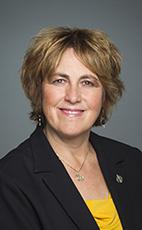Merci.
I would like to begin by acknowledging that we are gathered on the unceded territory of the Anishinabe Algonquin nation. If members would indulge me, I would also like to send a message of condolence and healing thoughts to the community of Constance Lake First Nation, which is struggling with multiple confirmed and suspected cases of blastomycosis, which has led to a growing number of hospitalizations, the loss of community members, and a search for answers about the source of exposure.
Mr. Chair, thank you for the opportunity to speak today. I am very pleased that the people of Algoma—Manitoulin—Kapuskasing put their trust in me once again and sent me back here to the House to continue working with you all to build a better Canada for them.
I also want to congratulate each one of you for having earned the trust of your constituents. I am happy to see many familiar faces, and I look forward to getting to know those of you who are newly elected.
I am confident that you will benefit from the experience of your colleagues, not only in your party's caucus but throughout Parliament, in the same way that I did when I was new to this place. That was 13 years ago.
Since first being elected, I have served on several committees. In the last two Parliaments, I served as Assistant Deputy Speaker. I gained much experience within that role, and I believe that with your support I will be able to fulfill the position of Speaker.
In my time in the chair, I have overseen numerous scenarios, including some challenging moments. Some of my decisions even resulted in New Democrats across the country questioning my loyalties to the party, which I took as a feather in my cap. I feel this speaks to my ability to be fair and steadfast in the position. That is why, when I wrote to you recently, I stressed that I am fair, open-minded and impartial. More than that, I am hopeful.
I understand, as most of you do, that there is more that ties us together than divides us. Even in this institution, which is built around the notion of division of opinion, circumstances can be shared across party lines as easily as they are within them. I believe that it is time for us to identify more commonalities even as we discuss big, potentially divisive issues. We can all see that discourse has been strained throughout society and that civility is more elusive than ever. It is important for us to consider that and act accordingly if we are to lead.
I make that point since the common narrative outside of Parliament is that this place does not work or is dysfunctional in some way. While many of us might provide an eloquent defence as to why that is not always the case, the fact is that the perception exists, is widespread and has only grown in recent years. Part of that may be sensationalism, but the narrative is persistent enough that we are best served to take it seriously and do our best to rehabilitate this institution's reputation.
One way that can occur is to change the habits of this place. I would argue that selecting a Speaker outside from outside the traditional governing parties is an important step in that direction. It would send the message that the desire for change is being matched with action.
I would also say that selecting a woman as Speaker would be another important step in that direction. When I look around the House, I am encouraged by all of the young faces. I think it is important for Parliament to reflect the diversity of our population, and young members full of enthusiasm and energy are significant assets.
It is unbelievable to me that so many of you have never seen a woman as Speaker of the House. It has been 37 years since Jeanne Sauvé's historic tenure as Speaker came to an end. With each new Parliament, her achievement fades further into the past, and the glass ceiling has been restored. Will we have to wait even longer?
As so much of society changes to value the roles and contributions of women, will Parliament remain an old boys' club? If so, is that why little seems to change in a positive direction with respect to the institution's reputation among Canadians?
Alternately, I think it is important that Parliament elect a woman Speaker so that young women can see themselves represented in our work in another meaningful way. I believe it might help to lower the temperature during impassioned moments of debate, but I would also add that I am personally more than prepared for the to-and-fro of heated debate. I have come from the labour movement, where I have extensive experience helping resolve disputes in an elbows-up environment.
In closing, I would remind members that Canadians are looking to us to make Parliament work in a way that will deliver results to them. I believe that choosing a Speaker from a smaller party sends a clear signal that we are prepared to do things differently. It would serve as a symbol of the kind of co-operation we are capable of and should strive for.
This is why I am asking members for their support.

